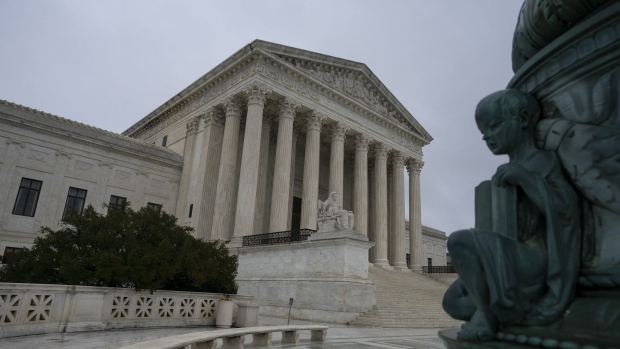Sep 18, 2020
Ginsburg’s Death Gives Trump Chance to Add Justice to High Court
, Bloomberg News

(Bloomberg) -- The death of Supreme Court Justice Ruth Bader Ginsburg on Friday gives President Donald Trump an opportunity to try to fill her seat -- and potentially cement a rightward tilt of the Supreme Court for a generation -- less than two months before Election Day.
Senate Majority Leader Mitch McConnell has previously said the Senate would act to fill a vacancy if one occurred this year, even though he spent most of 2016 denying a confirmation hearing to President Barack Obama’s pick to fill a vacancy on the high court.
McConnell would need to find 50 senators willing to back a pick put forward by Trump. With 53 Republicans, they can afford to lose 3 senators and still confirm a pick with Vice President Mike Pence casting a tie-breaking vote.
“We would fill it,” McConnell told Fox News in February. McConnell said then that the difference between 2016 was that the Senate and the White House were held by different parties.
Trump had not yet been informed of Ginsburg’s death, but Vice President Mike Pence was, according to people familiar with the situatoin
On Friday night, Democrats quickly demanded that any move to replace Ginsburg be left for the next president.
“The American people should have a voice in the selection of their next Supreme Court Justice. Therefore, this vacancy should not be filled until we have a new president,” Senate Minority Leader Chuck Schumer said in a tweet.
Days before she died, Ginsburg dictated a statement to her granddaughter, NPR reported, saying, “My most fervent wish is that I will not be replaced until a new president is installed.”
McConnell’s office hasn’t responded to questions about whether he will act before the election, but members of his leadership team, including Senator John Cornyn of Texas, have said they expect he would try to confirm someone before the elections if there is a vacancy.
Trump released a new list of potential appointees earlier this month -- revisiting a tactic he used in 2016 to galvanize support among conservatives and evangelicals. “Apart from matters of war and peace, the nomination of a Supreme Court justice is the most important decision an American president can make,” Trump told reporters on Sept. 9.
In 2016, McConnell blocked Obama from having a hearing on his nominee in 2016 -- Merrick Garland -- setting the stage for Trump to install Neil Gorsuch instead.
Democratic presidential nominee Joe Biden said at a debate last year that he was opposed to adding additional justices to the court if Democrats were to win the presidency.
“I would not get into court packing. We had three justices. Next time around, we lose control, they add three justices. We begin to lose any credibility the court has at all,” he said. But, if Republicans move to replace Ginsburg this year and Biden wins in November, he’d face strong pressure from the left to expand the court.
Senate Judiciary Committee Chairman Lindsey Graham, a South Carolina Republican, issued a statement that was silent on the question of whether Ginsburg should be replaced before Election Day. He called her “a trailblazer who possessed tremendous passion for her causes.”
“While I had many differences with her on legal philosophy, I appreciate her service to our nation,” said Graham, who is up for re-election this fall in an increasingly tight race.
(Updates that Trump had not yet been informed, in fourth paragraph)
©2020 Bloomberg L.P.








